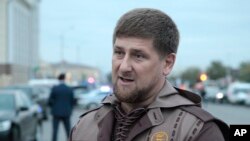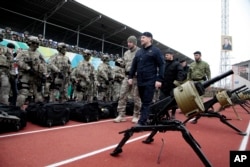Ramzan Kadyrov, the 39-year-old strongman who has held the post of president of Russia's Chechen Republic for nine years, rang in the new year by lashing out at Chechen immigrants who took to the streets in Vienna, Austria, on Christmas Eve to protest against his rule.
Declaring in a New Year's Eve address that "it is our custom that a brother answers for a brother," Kadyrov said he had given the order to find out whether the protesters "have brothers and fathers, which clan they belong to, where they were born, and who they are."
The Chechen ruler added, every available resource would be used to ensure that the relatives of the protesters "sort them out."
Kadyrov is known for publicly reprimanding fellow citizens who criticize the status quo in the republic. Last December, Chechen resident Aishat Inaeva complained in an Internet posting that officials were using violence to collect housing and utilities payments. Kadyrov forced her to appear on TV and recant.
Human rights organizations say Kadyrov has established a regime of personal power in the republic. The work of human rights activists in Chechnya is extremely complicated. They are threatened with physical violence, threats which are sometimes acted on. In December 2014, the office of the Joint Mobile Group of Russian human rights defenders in the Chechen capital of Grozny was destroyed in an arson attack.
The Russian opposition is currently preparing a report on Kadyrov. Ilya Yashin, deputy chairman of the opposition People's Freedom Party, or PARNAS, discussed it with VOA.
Q: What were the main reasons behind the decision to prepare a report on the activities of Ramzan Kadyrov?
A: The very existence of a regime like the one in Chechnya is a big reason for doing this and making the results public. Because this is a unique region; there is none other like it in Russia. It is a region where Russian laws are essentially not in force, where an autonomous political regime has been created. And it is a region that is not spoken about; the problems in this region are not discussed. Nevertheless, the problem grows bigger each year, like a cancerous tumor. And today, in my opinion, it threatens not only the stability and security of the North Caucasus, but the national security of the whole country. Thus, the working title of the report is: "A Threat to National Security."
Q: What is the threat, as you define it in the report? What aspects of the phenomenon called "Kadyrov's Chechnya" can penetrate beyond the republic's borders?
A: The threat is that Kadyrov has become a fairly major political figure which nobody can manage or control. The absence of any control or countermeasures gives Kadyrov a feeling of absolute license and impunity. He has large financial resources; standing behind him are thousands of well-trained and well-armed fighters who are loyal to him personally, not to Russia's laws or constitution. Considering all these factors, the problem of Kadyrov personally and his political regime as a whole creates a threat not just in relations between Chechnya and the federal center: It poses a threat to the country's national security, by discrediting the entire legal framework. When the head of one of (Russia's) regions publicly orders his policemen to shoot at police or investigators from other regions, and does not experience any pushback, it is, of course, a challenge to the entire Russian state.
[NOTE: Last April, after a Chechen man was killed in Grozny by police from the neighboring Stavropol region along with officers from the Russian Interior Ministry, Kadyrov told security forces under his control that they should shoot to kill any outside security officers "whether from Moscow or Stavropol," who appear on their territory without their knowledge.]
Since the state does not counteract this, I believe that civil society and the political opposition should raise the issue. Because I think that this problem still can be solved. However, if the trend continues, at some point this problem will simply be impossible solve.
Q: But Moscow does not just fail to criticize Ramzan Kadyrov and his associates; it actually shows them much consideration. Kadyrov and Mohammed Daudov, chairman of the Chechen parliament, have both been awarded the title "Hero of Russia." Another person close to Kadyrov, Adam Delimkhanov, sits in the State Duma (the lower house of Russia's parliament). Don't you think that the Kremlin, in general, likes the manner in which the Chechen leadership acts?
A: I don't think that's the case. Indeed, Chechnya is covered in all manner of awards and medals. Even not-so-high-ranking law-enforcement and security officials have at least one state decoration. You don't have to go far to find examples: Zaur Dadaev has a state award, and this is the man who is now the prime suspect in the murder of (opposition leader) Boris Nemtsov: according to investigators, he pulled the trigger. Ruslan Geremeyev, with whom he (Dadaev) traveled to Moscow, and who is now hiding from investigators, also has a state decoration. I think the reason for this is not that the Kremlin considers Chechnya a kind of model: if all regions were like Chechnya, we just couldn't afford it, because money is piled into Chechnya every year. On the contrary, Kadyrov in large part copies the style of Putin with the addition of a certain religious and national features, which makes his regime even more odious than Putin's. I think the reason for the massive financial bailouts and endless awards to Kadyrov and his entourage, his officers, his fighters, is that this is now the Kremlin placates Kadyrov.
Q: Why does the Kremlin placate him?
A: The Kremlin is well aware that Kadyrov's regime is dangerous, and that Kadyrov himself is dangerous. Kadyrov, in fact, recognizes the power and authority of just one person in Russia — Putin — and will do so as long as it is to his advantage. Therefore, inside the Kremlin they are, of course, wary of Kadyrov. In the FSB (Federal Security Service) they are afraid of Kadyrov, in the Investigative Committee they are afraid of crossing Kadyrov. Behind Kadyrov is a huge army of many thousand fighters, armed to the teeth, who only yesterday fought against Russian soldiers, and know well the taste of blood. Today, they are legalized in the Russian power structures, but are subordinated and personally loyal to Kadyrov. Thus, fearing Kadyrov, they (the federal authorities) cajole and try not to provoke him, endlessly award him, and cede spheres of influence to him. But the problem is that Kadyrov's appetites grow with each year. If yesterday he was content with the role of leader of his region, today his interests have spread to neighboring areas. People with Chechen FSB identification cards organize illegal takeovers of businesses in other regions. Operating in Moscow are dozens of people formally associated with Chechnya who from time to time are detained in connection with various criminal activities. They specialize in hostile takeovers, kidnapping for ransom, fraud. So this is a problem that is growing.
Q: You mentioned the murder of Boris Nemtsov. Do you think that Ramzan Kadyrov knew that this murder would be committed?
A: The bloody footprints from the Bolshoi Moskvoretsky bridge (NOTE: the bridge near the Kremlin where Nemtsov was shot) lead directly to the highest-level Chechen offices. I do not believe for a second that people from Kadyrov's inner circle could organize such a high-profile, headline-making political murder without having received, in one form or another, Kadyrov's consent, nod, agreement. Were that not the case, then Kadyrov could see it (Nemtsov's murder) as an attempt to frame him, to discredit, to put him in conflict with the federal security forces. Therefore, the probability of this is extremely small: Organizing it without Kadyrov's knowledge would have been too great a risk. I don't believe it. So, from my point of view, Kadyrov should be one of the key suspects in this criminal case. And that's why lawyers for the family of Boris Nemtsov, and the PARNAS party, and I personally have been trying for the past several months to ensure that Kadyrov is, at the very least, questioned. The investigators should have many questions connected to the fact that people who are now behind bars, who are wanted (in connection with the case), are, in essence, subordinate to Kadyrov. These are people who serve in his security structures, people he knows personally, on whose chests he personally pinned medals, and who he publicly called patriots of Russia after the murder. So there really are a lot of questions for Kadyrov. And the fact that the investigators refuse to interrogate him, are even afraid to ask him questions, of course testifies to the fact that a political decision has been made not to touch Kadyrov under any scenario, not even to annoy him by formally calling him in for questioning. The investigation is not even willing to do that — it would be seen as a kind of attack on Kadyrov, which is obviously not permitted at the highest political level of our country.
Q: In preparing this report, you probably examined how much Chechnya costs Russia. Did you calculate approximately how much money goes there?
A: Yes, we undertook some expert estimates, for which we enlisted economists. I will provide the figure when we present the report, but I am not ready to do so before then. But I have to say that there are certain difficulties. It is possible to calculate direct transfers from the federal budget, money which is directly transferred annually. But there are also funds that are difficult to assess: for example, the construction of some public facilities on the territory of Chechnya. In addition, the Chechen regime and Kadyrov have a huge number of additional sources of income. There is, for example, the Akhmad Kadyrov Fund (NOTE: named for Kadyrov's father, who ruled Chechnya from 2000 to May 2004, when he was assassinated), has an extensive network of business not only in Chechnya but also in other Russian regions. There are revenues that are associated with the international status of Grozny Airport, which the federal security forces are unable to control. And according to our sources in law enforcement, this airport may be a major transshipment point for international contraband. When Sergei Stepashin, former chairman of the (federal) Audit Chamber, was asked to explain the difference between Kadyrov's declared and actual income, Stepashin quite frankly said that Kadyrov owned the whole of Chechnya, therefore there was no need to worry about him.
Q: Where is the red line that Ramzan Kadyrov can cross in order to become objectionable to the Kremlin? Will your report answer that question?
A: The problem is that Kadyrov seems to have already crossed every possible red line, and the process of replacing him or removing him from power should have been started long ago. The fact that this has not happened suggests that the federal authorities, and Russian society as a whole, have in fact become hostages of the policy that Putin is conducting in the North Caucasus. Because Kadyrov and his political regime are the main result of Putin's policies in the North Caucasus, which have brought us to a dead end. And those in the Kremlin are obviously not proposing a way to solve this problem.





